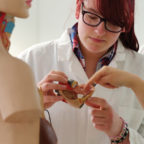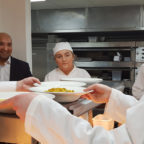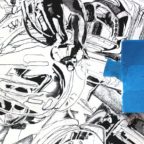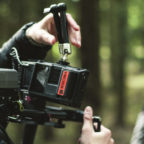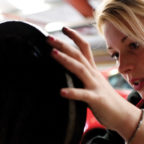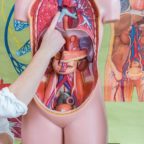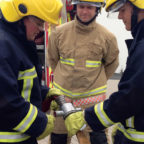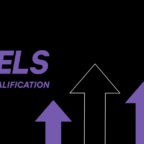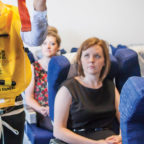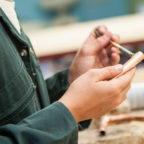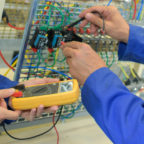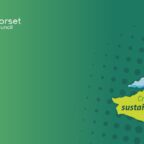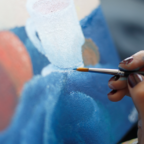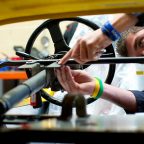

 Foundation Diploma in Art and Design (L3/4)
Foundation Diploma in Art and Design (L3/4)
UAL Foundation Diploma in Art and Design (L3/4)
In Short
The Foundation Diploma in Art & Design offers you a great opportunity to explore and establish your practice within the broad-based study in art and design, it is the perfect place if you are confident in your creative direction to build and develop your practice, skills and portfolio, equally if you are still undecided about direction but excited by multiple possibilities it is a great place to explore and clarify your creative interest, wherever it may lie within the creative arts.
You will acquire creative and practical skills and build up a strong portfolio of work through project and studio led practice, supported by industry experience, visiting artists, regular visits to galleries and an international trip. The Foundation is a truly exciting course that is designed to allow you to explore and establish your own specific creative practice. Through a series of intensive workshops, you will be exposed to a huge variety of working methods, media and ideas to allow a strong skills base and a truly informed decision when specialising in a given field. You will also undertake independent projects in which you lay the foundations for your working practice, learning how best to inform and develop outcomes within a sustained creative framework.
This course is not a higher education course but has been designed to prepare students for degree level study upon completion if they should wish.
Why study with us?
Our students are taught using excellent traditional, state of the art and experimental facilities, such as; print studio, textiles workshop, ceramics room, 3D workshop with wood, metal and resin facilities, a 3D printer and large bed laser cutter, brand new specialist PC suite carrying industry standard software, photographic studio and dark room and a large, dedicated drawing and painting studio.
You will have the opportunity to collaborate with professional artists and photographers to gain valuable experience as you work on curating and delivering an Arts Festival and engage in a variety of live projects and experiences – including international, national and local trips, life drawing and talks from visiting artists and photographers.
Entry Requirements
- You should be at least 18 years old in the September of enrolment
- 5 GCSEs at minimum grade 4 including English
- One A level, or equivalent Level 3 qualification, preferably in a relevant creative subject.
- Basic computer literacy.
We also welcome applications from mature students who may not have all these qualifications. Selection is based on an interview and your portfolio. You must demonstrate your abilities to explore ideas and media such as:
- Observed drawing
- Colour work in any media
- 2D and/or 3D work
- Photography
- Computer-based work
- A piece of critical writing
All portfolios should include sketchbooks, scrapbooks and work which illustrate your thinking processes and development of ideas as well as finished pieces. Other information such as assessment results and relevant experience may be taken into consideration at the College’s discretion.
Course Content
There are three main stages to this course; Diagnostic Investigation into Creative Practice, Developing Specialist Practice and Consolidating Practice. Each stage builds upon the last aiding to refine and develop your creative practice. Within the early stages of the course the focus is on developing your skills and enabling you to find out exactly where your interests and creative practice may lie, whereas in the latter part of the course a strong emphasis is placed on personal ownership and you taking responsibility for your own work and its development.
Throughout the course you will have your own dedicated studio space and open access to a wide range of industry appropriate workshops; Print room, 3D workshop, Ceramic Studio, Photo Studio, Darkroom, Textiles and the Mac Room.
The three stages progress the academic level at which you are studying, the course begins at Level 3 in stage one, then stage two and three are delivered at Level 4. If you intend to progress on to higher education this will put you at a significant advantage on that course.
Stage One: Diagnostic Investigation into Creative Practice (Level 3). You will have the opportunity to work across a wide range of art and design disciplines from illustration to fine art Installation, taught by staff who are specialists within the field. The workshops and educational environments are all subject specific and equipped to a professional standard. Within the projects, the emphasis is placed on the exploration of media and materials, demonstrated through observing and recording information, the development of skills and creative responses, and is underpinned with strong and broad-ranging research. Drawing is a critical skill within all disciplines, vital as a research tool, crucial to observation, and a method to both explore and communicate ideas. To develop and strengthen your skills, life drawing is integral to the course and practiced weekly for the first term. Alongside the practical there is also a strong contextual element to the course with a programme of lectures and weekly talks from visiting artists, both of which enable a greater understanding of your creative practice.
Stage Two: Developing Specialist Practice (Level 3 / 4). Having identified your interests within the creative fields, this stage allows you the chance to clarify and consolidate your ideas and hone the necessary skills for your practice. The course splits into two halves, the Fine Art and the Visual Communication Pathways, however, we do encourage interdisciplinary practice and never pigeonhole a personal practice. Stage two begins with a skills-based project where you will develop a personal project through a series of elected industry specific creative workshops. The second project is based around a research trip to Berlin to examine the art and culture of the city. And the last project is the Arts Festival / Industry experience where you will have the opportunity to work alongside a professional artist on an external project and artistic extravaganza. You will gain confidence in generating, developing and presenting your work and ideas, as well as building up a distinctive portfolio of work in preparation for higher education interviews.
Stage Three: Consolidating Practice (Level 4) This is the graded element of the course and the exploration of a personally defined studio led project which will be exhibited in the end of year show.
How will I be assessed?
Stage one is taught at level 3 and is pass or fail, with a review in October and a formal assessment and diagnostic review in November.
Stage two is delivered at level 3 / 4 and is pass or fail, with ongoing review and a formal assessment in February.
Stage 3 is delivered at level 4 and assessed and graded at level 4 on portfolio evidence and final exhibition of work.
Progression
Students who completed this course have moved on to BA (Hons) Fine Art, Graphic Design, Interior Design, Animation, 3D Design, Photography, Video Production, Crafts, Fashion and Textiles, and Illustration at institutions such as University of the Arts London, Falmouth University College, University of Brighton, Winchester School of Art, University of Salford and UWE. Students have also gone on to work as freelance artists, fashion designers and production assistants at companies such as Aardman, Next and the BBC.
Fees
If you are aged 16-18 as of 31 August on the year of enrolment – no course fee. If you are over 19 as of 31 August and enrolling on a full-time programme of study a tuition fee will be applicable in most cases. Age 19-23 and it’s your first full level 3 Qualification – No fees to pay. Age 19-23 and you already have a level 3 qualification – Fees of £5421. Age 24+ – Fees of £5421. You have the option to apply for an advanced learning loan to cover your fees, please call 01305 761100 to book an appointment to speak to the guidance team about this. There are financial support arrangements (Bursary Funds) for 16-18 year olds and hardship funds available for the over 19s. Please contact reception for details – email enquiries@weymouth.ac.uk
Please note International Students will be charged an additional £250 admin fee on top of their tuition fee.
